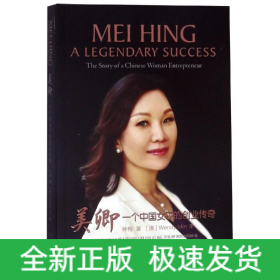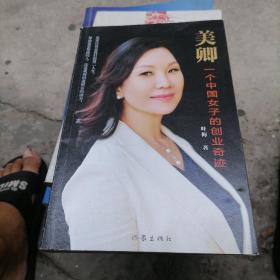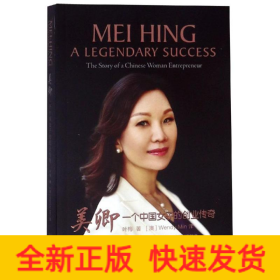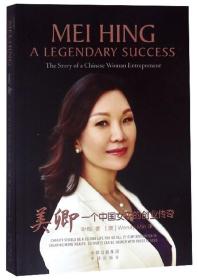
美卿:一个中国女子的创业传奇
全新正版 极速发货
¥ 25.5 4.3折 ¥ 60 全新
库存2件
广东广州
认证卖家担保交易快速发货售后保障
作者叶梅
出版社中国对外翻译出版有限公司公司
ISBN9787500151807
出版时间2019-06
装帧平装
开本32开
定价60元
货号1201901419
上书时间2024-11-21
- 最新上架
商品详情
- 品相描述:全新
- 商品描述
-
作者简介
叶梅,中国作家协会主席团委员,多年从事文学创作、编辑及评论,著有小说集《撒忧的龙船河》、《五月飞蛾》、《很后的土司》、《妹娃要过河》、《歌棒》,散文集《我的西兰卡普》、《朝发苍梧》、《大翔凤》,《从小到大》、《穿过拉梦的河流》,长篇纪实《九种声音》、《种爱》,《叶梅研究专集》等。
目录
本书共有4个章节。章:All was made possible by reform and opening-up;第2章:John Naisbitt: Plan a “forest” to make “trees” grow;第3章:All new ventures need time to mature;第4章:Learning from the past to inform the future
内容摘要
本书由作者叶梅撰写,图文并茂,真实地展现了中国当代女企业家翟美卿的创业历程以及她所开创的慈善事业。作为改革开放代创业者,她从一个饭店的洗碗工开始进入社会,后来又历经卖牛仔裤、卖床垫、开家具商场、到房地产开发、到金属制造等,经历百般风险奋斗,曲折艰难,后来逐步壮大成为一个拥有巨量资产的现代企业集团——香江集团的总裁。翟美卿的人生丰富多彩,事业辉煌灿烂。但她却是一位虽然年轻,可很好明晰自己的来路和应当继续走去方向的企业家。她的传奇故事对启迪当下社会全民创业创新具有现实意义。
主编推荐
翟美卿是这个时代的骄子,是一位充满爱意的慈善家,是中国妇女引以骄傲的女杰。她肩负了很多头衔,全国政协委员、全国妇联常委、中国女企业家协会副会长、香江集团总裁…… 她有一个和睦兴旺的大家庭,携手并进、极爱她的丈夫,两个人人称羡的儿子和两个漂亮的女儿,人生在她身上体现出罕见的完美。翟美卿女士是一位践行大爱大善、热衷公益慈善事业、尽企业社会责任的实干家,她数十年自觉地以慈善为己任,这种精神值得大家学习。
精彩内容
A dream born in an old house on New Lupai Street “When I look back over the past thirty years,” Mei Hing Chak says with emotion, “I realize that everything we’ve accomplished was made possible only by reform and China’s opening-up. I think about it a lot.” Wanting to tell her children what she had experienced over those years, knowing how little they or perhaps anyone else knewor remembered of how the Heungkong Group had developed, she was keen the story should be set down. She hoped that the legacy she might leave her children and grandchildren was not one of just money, but also one of spirit and culture. A monetary inheritance might support a few future generations, but she herself had ventured into the business world with nothing in her hands and knew how with hard work and determination so much can be attained. The youngest child in her family, Mei Hing was born in the early summer of 1964. She had an elder sister and two elder brothers, and the affection shown to her by her parents and siblings encouraged her to develop a lively independence. Her parents immigrated from their native Zhaoqing to Guangzhou, the province’s capital, and Mei Hing was sent to a kindergarten where she boarded. Her father was the head of a construction team and worked very hard every day. Her mother was a saleswoman in a department store selling confectionery and tobacco. Such couples were known as “double income” parents, unable to stay at home to take care of their children. But in their spare time Mei Hing’s parents did their very best to make sure their four children’s lives were filled with much happiness. Among other things, Mei Hing learned to play chess with her father. In the hometown where they lived, he was regarded asbeing educated, and learning from him made her extremely proud. In her grandfather’s time, the family had owned land and had enjoyed some reputation locally, but for some reason this wealth had since disappeared. Although Mei Hing’s father had had a basic education, he had not gone to university. He had taught for several years in a countryside village and was able to write letters for other people and to do bookkeeping. Her father had an excellent memory and when he played chess, he seldom checked the position of the pieces. Little Mei Hingwatched him play and was very curious about the game. As time went by, she gradually learned how to play herself. Her brothers were both already good at the game and always beat their opponents. Decades later, her eldest son, Sam Lau, also became a top chess player and was o en school champion. Mei Hing inherited her father’s good memory and from an early age was adept at numbers and mathematics. After school, she would put up a small blackboard in an alleyway by her home and teach her little friends how to do their sums. The alley off New Lupai Street in Guangzhou, where Chak and her family lived, connected with a narrow street at one end and had only houses at the other. Since the alley was a cul-de-sac, few but residents used it, so it was a quiet spot for the children to play in. Her neighborhood friends would sit on small chairs happily listening to little Mei Hing teaching them how to add up numbers. Although her parents’ day started early and finished late, the family was not very well off. Theirs was a life of scrimping on food and clothing. Until she was eighteen years old, Mei Hing remained living in the alley and as far as she was concerned in no way did things improve or change. All the houses in the alley were old and had black carved doors and high thick walls. is was the typical Guangzhou style. Her parents added another floor to the cramped house to create an attic for their four children, while they continued living downstairs. The conditions were very impoverished, but the children were happy. However, Mei Hing often dreamed that one day they would have a bigger house. Sleeping together with her siblings in the attic, she would listen to her brothers breathing heavily at night and cling to that dream of her family living in a large, bright house where she had her own room filled with her favorite books, and of course chess, and where she would also dance to beautiful music. Mei Hing relived this scene in her dreams all the time they remained in the old house on New Lupai Street… and did so formany years.
媒体评论
◆ 这本书塑造了一个从个体户到现代企业家、又到慈善家、很后到一个很综合的精神文明和物质文明完美结合的伟大母亲形象,为文学艺术画廊增加了一个新的典型形象。同时,从文学的角度讲,这本书是一篇很好优美的长散文,用散文的笔调,细腻的笔法塑造了人物的心灵世界,把人物成长过程中心灵、世界的美好和崇高的境界展示得很好令人信服,是一本很好读的书,也是一本很耐读的书。——中国传记文学学会副会长 忽培元◆ 翟美卿女士在创业二十多年的历程中展现出了非凡的胆魄和才华,香江集团在她的带领下,发展成为靠前外具有影响力的大型企业集团,为中国民营经济发展留下浓墨重彩的一笔。——原全国政协副主席、全国工商联主席?黄孟复◆ 一位女性在90年代初能有北上创业这种魄力着实令人佩服,创业成功后创立靠前少有私募基金会,不忘回馈社会更是令人钦佩! 此书对转型中的企业家和正在创业路上的创业者们会有不少启发,建议购买! ——zeseen◆ 时代造就了翟美卿,但同时她的性格无疑是铺垫了她一生命运的基石。虚怀若谷大概就是成功人士推荐的标示,敢想、敢干一切才有可能。现代人不欠缺想法,却欠缺实干的精神,向新一代杰出女性致敬! ——无昵称用户◆ 翟美卿是一个注重学习的人。香江集团能够建立起制度化的管理模式,使企业发展有长足后劲,与翟美卿的注重学习是分不开的。——无昵称用户◆ 《美卿:一个中国女子的创业奇迹》不仅写了创业者的人生轨迹,同样描述了创业者的内心精神世界,这样使作为读者的我们更容易学习。——无昵称用户
相关推荐
— 没有更多了 —





















以下为对购买帮助不大的评价